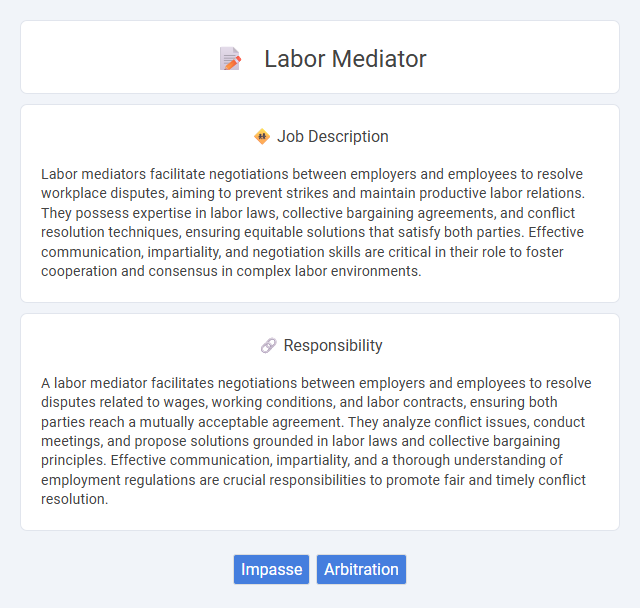
Labor mediators facilitate negotiations between employers and employees to resolve workplace disputes, aiming to prevent strikes and maintain productive labor relations. They possess expertise in labor laws, collective bargaining agreements, and conflict resolution techniques, ensuring equitable solutions that satisfy both parties. Effective communication, impartiality, and negotiation skills are critical in their role to foster cooperation and consensus in complex labor environments.
Individuals with strong communication skills and the ability to remain impartial are likely suitable for a labor mediator role, as the position requires facilitating negotiations and resolving conflicts between employers and employees. Those who handle stress well and possess patience may find this job aligns with their temperament, given the often sensitive nature of labor disputes. People who lack empathy or struggle to remain neutral might face challenges in this profession, reducing the probability of success.
Qualification
A labor mediator must possess strong conflict resolution and negotiation skills, often supported by a background in labor relations, law, or human resources. Certification from recognized organizations such as the Federal Mediation and Conciliation Service (FMCS) enhances credibility and expertise in mediating collective bargaining agreements. Experience in labor laws and workplace policies is essential to facilitate fair and effective dispute resolutions between employers and employees.
Responsibility
A labor mediator facilitates negotiations between employers and employees to resolve disputes related to wages, working conditions, and labor contracts, ensuring both parties reach a mutually acceptable agreement. They analyze conflict issues, conduct meetings, and propose solutions grounded in labor laws and collective bargaining principles. Effective communication, impartiality, and a thorough understanding of employment regulations are crucial responsibilities to promote fair and timely conflict resolution.
Benefit
Labor mediator jobs likely offer significant benefits such as enhanced conflict resolution skills and increased job satisfaction from helping parties find mutually agreeable solutions. Individuals in this role probably experience strong demand in various industries, potentially leading to stable employment and competitive salaries. Opportunities for professional growth and networking within legal and organizational frameworks may also be common advantages.
Challenge
Labor mediator roles likely involve navigating complex disputes between employers and employees, requiring strong communication and negotiation skills. The challenging nature of addressing conflicting interests and maintaining neutrality could test a mediator's patience and problem-solving abilities. Handling high-stress situations while seeking mutually acceptable solutions may frequently arise in this profession.
Career Advancement
Labor mediators facilitate negotiations between employers and employees, resolving disputes to maintain workplace harmony and productivity. Career advancement opportunities include roles such as senior mediator, labor relations specialist, or positions within government agencies and labor unions, often requiring advanced negotiation and conflict resolution skills. Gaining certifications like the Federal Mediation and Conciliation Service (FMCS) credential can significantly enhance job prospects and professional growth.
Key Terms
Impasse
Labor mediators specialize in resolving impasses during collective bargaining negotiations by facilitating communication and suggesting compromise solutions. They analyze conflicting positions between labor unions and employers to identify underlying issues and propose mutually acceptable agreements. Effective mediation reduces strike risks and fosters productive labor-management relationships, ensuring timely resolution of disputes.
Arbitration
A labor mediator specializes in conflict resolution between employers and employees, particularly through arbitration to settle disputes without litigation. Arbitration involves a neutral third party who reviews evidence and arguments to issue a binding decision, ensuring fair outcomes in labor disagreements. Expertise in labor laws, negotiation tactics, and contract interpretation is essential for effective arbitration in the labor mediation field.
 kuljobs.com
kuljobs.com